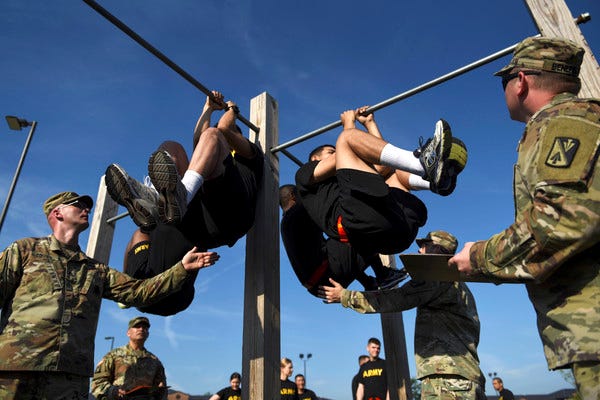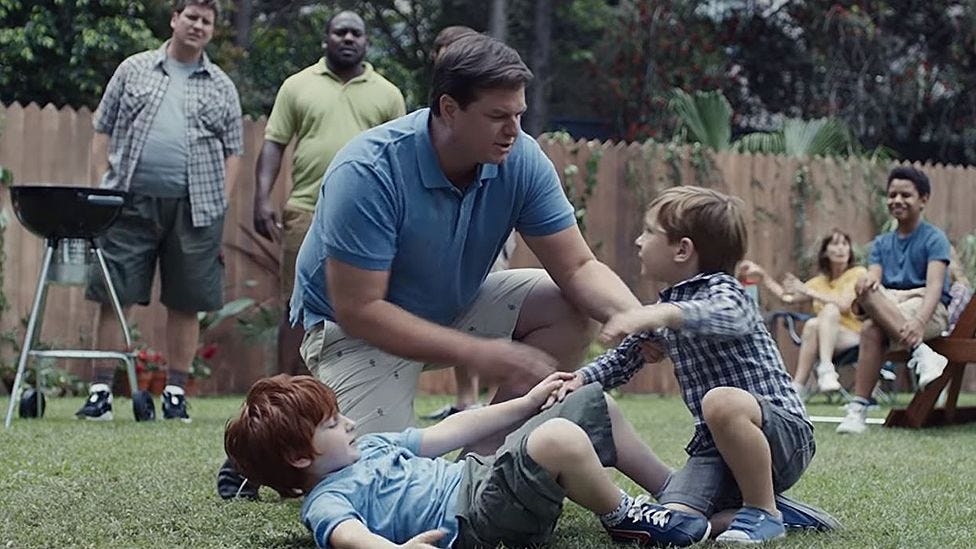Well, it’s been about 8 months and my eyes seem to be recovering since I turned away from computer screens to using a wall projector. Not subjecting myself to close-up glare and blue light has been a revelation in learning even after decades in the health field. Though still careful, I am indeed grateful at the progress.
So I’m going to try to do some writing again and see how it turns out. My thoughts lately have been on the subject of how strength defines a man, so in this article I want to discuss both physical and moral strength, both which are needed for the complete, masculine man.
Masculine Physical Strength
The definition of physical strength is associated with masculinity, referring to muscular power and the ability to perform physically demanding tasks. Men are supposed to be strong - that’s just part of their physical makeup.
In the not-so-distant past, before the advent of modern conveniences, daily life demanded physical fortitude, resilience, and muscular strength. Hunting wasn’t a sport, but strenuous work that favored the tallest, heaviest, and strongest individuals. Men's inherent capabilities for greater strength, speed, and endurance made them the ideal choice for roles such as building, protecting, providing, and fighting, relying on their cunning and physical prowess to emerge victorious.
This predominant male role of warrior and protector has persisted into the modern era. Female military personnel often struggle to meet the physical standards set for male soldiers. For instance, the pull-up test is a challenging task for many female Marines, with over half failing to meet the minimum requirement of three pull-ups. Additionally, out of the 14 women who have attempted the rigorous Marines’ Infantry Officer Course, all have failed to complete it, with the vast majority failing on the first day.
An ethnographic study of 70 cultures worldwide revealed that 87% of them restrict women from engaging in war. This is largely due to fundamental biological and psychological differences between males and females, which affect motivation, temperament, aptitude, and effectiveness. In practical terms, if World War III were to occur today, it’s unlikely that any country would deploy its women to the front lines in large numbers.
Testosterone plays a significant role in the traits associated with the warrior/protector role. It’s associated with a heightened inclination in men to engage in competitive activities and assume risks, leveraging their superior physical strength and the greater muscle-to-fat ratio in direct confrontations. Additionally, testosterone contributes to a lower incidence of injuries from strenuous activities and physical collisions due to the denser bone structure typically found in males.
The ArtofManliness emphasizes physical strength as a key determinant of a man's ability to assert himself in various situations, including the willingness to stand up to threats. Even the most progressive men are unlikely to entrust their wives with tasks that require physical courage, such as investigating a suspicious noise at night or seeking help when a car breaks down in a remote area. They are more likely to protect their families themselves, ensuring that their wives remain safe and secure.
Even in our modern, often-safe suburban environments, the importance of physical strength remains evident, especially when it comes to emergency situations like rescuing someone from a burning building or moving heavy items around the house. While we have an array of gadgets to assist us with these tasks, the fundamental reliance on our muscles to overcome challenges remains. In times of necessity, when all else fails, our ability to use our muscles to meet the demands of the situation is what truly matters.
Yet today, the necessity of physical strength may seem less relevant to many men, particularly those who spend their days at desk jobs. The average Millennial male is physically weaker than his father, with manual labor being an alien concept to him. Between 1985 and 2016, there has been a noticeable decline in grip strength among Millennial men, from 117 pounds of force to 98 pounds, a decrease that matches that of older Millennial women. This indicates that the grip strength of a typical Millennial male is no greater than that of a 30-year-old mom.
Yes, I know it’s only one study, one measure of overall physical fitness. But these findings are consistent with other studies showing kids are less fit today. (For example, it takes children 90 seconds longer to run a mile than it did 30 years ago.) Simply put, we’re not making them tougher, or better today.
A lot of this begins early on in life. In the age of zero-tolerance school-disciplinary policies — where any kind of physical confrontation (even touch tag) is treated like a human-rights violation — they have less opportunity to develop toughness. Today’s young males don’t have common touchstones for what it’s like to grow up to be a man.
Imagine the disgust and contempt our ancestors would have for us all if they lined up modern men on the street. Could we keep up with their exploits? Could we step into the manly role of times past?

One way to be physically stronger is to strength train. I’m not as young (or as strong) as I used to be, but I remember how awesome it felt the first time I deadlifted 600 lbs in my prime. When the bar bent, I felt like a beast. I still work hard at strength training today and my favorite saying is that “strength will always have it’s rewards.”
Lifting boosts testosterone, which is the lifeblood of masculinity. Thus, if you want to feel more like a man, you should seek to build your body. Strength-building also imparts character virtues through the pain and dedication required to work out regularly. Nothing good comes without work and a certain amount of pain. When you finish a workout that leaves you exhausted, it reveals a bit more about yourself, especially when it comes to facing other tough things in life.
Men, doing what your body is meant for, is an incredible feeling. If you go your whole life without experiencing this feeling, at its peak, that is a shame. It’s also a disgrace to grow old and weak through carelessness, without developing your bodily strength to assist you when you need it most.
Pain is the call to manliness, though we have to be careful to to lift with restraint and self-control, and not with the ego. We don’t want to become billboards for imbalance and insecurity. The important thing is finding a workout path that you love, that inspires you to get moving and build muscle, and that you’re going to stick with.
Strength is a defining attribute of masculinity and the literal power that has allowed generations of men to protect and provide for their families. It lays a foundation for developing a strong, manly body, so strive today to become stronger than you were yesterday.
Masculine Moral Strength
Toxic masculinity is a term that refers to the set of societal expectations placed on men to adhere that traditional masculine traits such as aggression, dominance, and emotional suppression. Manliness today has been refashioned through this gender destroying term, a lie born of misdiagnosis, and a trap even big business is falling into.
“The shaving-supply company Gillette released a controversial ad reminding guys of their “toxic masculinity," a phrase that has popped up to describe the supposed hazards of typical male behavior.
“The ad begins by showing men engaging in Neanderthal-like activities including cat-calling, bullying, mansplaining, and using sexual innuendo when talking to women. Then, in a cloyingly obvious nod to #MeToo, the ad suggests that men can “get closer to [their] best” by being empathetic to women’s needs and intervening when their pals engage in harassing behavior.”
It’s basically an ad about men being reminded that their default position is bestial. Modern ad executives have fallen prey to this narrative, an extreme response to the equally ridiculous “women are victims” narrative.
The American Psychological Association also piled on, stating that "traditional masculinity — marked by stoicism, competitiveness, dominance, and aggression — is, on the whole, harmful.”
It’s a miracle society has come this far with such a dangerous animal lurking about. But lest we forget, second and third wave feminists over the last 50 or so years keep reminding us that the patriarchy of men, with their masculinity in general, have been the source of all women’s suffering. Manly characteristics are the source of everything bad in life, cries the #MeToo movement, as they huddle in corners because they feel threatened from the supposed “toxic masculinity.”
Boys naturally possess qualities such as energy, aggression, ambition, joy, and courage. Instead of repressing these traits as toxic and have boys go against their inherent nature, it's important to guide them in a positive direction. Fathers, it's crucial to raise your sons to be men. Disregard external influences and establish boundaries for your children. Encourage competition and leadership skills’ use verbal assertiveness and teach him competition and leadership skills. Don't rely solely on educational systems, which may be corrupted. And avoid the influence of the #MeToo movement and the third-wave feminist ideology, which aims to blur the lines between men and women.
When fathers don’t adequately teach their sons the fundamentals of manhood, they grow up to be men who haven’t learned the essentials, exhibiting boorish behavior and thoughts, or they may become feminized gay men straddling the line between genders. No one benefits when men are unable to embody masculinity, as this concept has become a social taboo. Ironically, this creates a significant void for women, as men who can’t be real men can’t provide women the feeling of being real women.
The difference between toxic masculinity and real masculinity is moral strength. And moral strength is about making ethical choices and standing firm against temptation. It includes integrity, reliability, and the willingness to do what’s right even when it’s difficult. When combined with true masculinity, a man that is kind, honest, controlled, disciplined, heroic, protective, morally and physically strong, rational, and even soft at the right moment, emerges.
More precisely, true masculinity is the evidence you see in the words and deeds of a man embracing his God-given role — his destiny as a man. He sets his mind to attain the qualities of sound character, confidence and strength. He is an unselfish, stable, dominant (though not domineering), and a decisive leader. Yet he is balanced and tempered by the complementary traits of humility, attentiveness, gentleness and refinement. (Biblical Manhood, 2017).
Men who are strong physically and morally possess the kind of masculinity the world needs more of. They are a benefit and a blessing to those around them and they are what women crave, if they’re honest about it. In short, ladies don’t ask us not to be men. Ask for real men!








